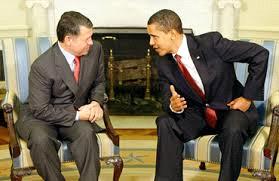Ammon News - The United States relies on Jordan to help resolve many of the thorniest problems in the region, including fighting terrorism, dealing with the consequences of the Syrian civil war and finding a peaceful resolution to the Israel-Palestinian conflict. It is in this context that U.S. officials recently told the Associated Press that preparations were being made for U.S. Special Forces to train Iraqi troops on Jordanian soil in the near future.
According to David Schenker of the Washington Institute for Near East Policy, a former Levant country director in the Office of the Secretary of Defense, the United States and Jordan have “a close working strategic relationship” that has previously included training Iraqis. “Hundreds, if not thousands, of Iraqi troops and officers have trained in Jordan,” he explains, and it would “make sense” to conduct future training there.
He adds that the United States provided extensive funding for a counterterrorism center built near Amman by the U.S. Army Corps of Engineers.
The need to build Iraq’s security forces has assumed a new urgency since al-Qaida-linked militants took control of the Iraqi city of Fallujah. At an event in Washington on Tuesday, Sen. John McCain expressed the profound frustration he and many U.S. lawmakers share over this development. Iraq is “now an abject failure” since the departure of U.S. troops at the end of 2011, following the failure to secure an agreement to keep a U.S. military presence in Iraq. Moreover, McCain said, instability in Iraq is now spilling over into Syria.
U.S. President Barack Obama is scheduled to meet with King Abdullah of Jordan next month to “continue consultations on regional developments, including Middle East peace and Syria,” according to a statement from the White House.
Jordan is among the countries most directly affected by the ongoing violence in Syria, with which it shares a long border. More than 500,000 Syrian refugees have fled to Jordan, a country with a population of only 6.5 million. In a hearing on the subject last month, Sen. Patrick Leahy said that this level of refugee inflows would place “enormous strain” on the resources of even a rich country, and pointed out that numerous Palestinian refugees are already in Jordan.
Jordanian Ambassador to the U.S. Alia Bouran said in the same hearing that despite the refugee burden, which also includes a large number of Iraqis, Jordan “stands firm in its commitment to keep its borders open.” She pointed out, however, that the refugee influx has contributed “to one of the worst economic and financial difficulties we ever witnessed.”
Schenker points out that Syrian President Bashar Assad could make the refugee problem much worse. The Syrian regime has so far refrained from attacking power stations in the south, but doing so could send another wave of Syrians into Jordan.
The United States provides approximately $1 billion in aid annually to Jordan. Part of that aid goes to building up Jordanian military capabilities, especially in the areas of border control and counterterrorism. A capable Jordanian military is important to the Israel-Palestine peace process, since Israel will need to rely on Jordan as a security partner to combat militancy as part of any two-state solution.
Jordan is also concerned about Syria’s use of chemical weapons and ballistic missiles, and a U.S. Patriot air and missile defense battery has been stationed in the country. U.S. personnel operate the battery and train Jordanians to manage the consequences of a potential chemical attack on or near Jordanian territory, Schenker explains. This could include treating refugees affected by chemical attacks within Syria.
The United States has provided similar capabilities to Turkey and Israel, due in part to fears about Syrian attacks on those countries. The U.S. Missile Defense Agency does not list Jordan as a cooperative partner, which may indicate that the United States does not currently see Jordan as a permanent partner in its planned regional missile defense system in the Middle East.
Syria has not threatened Jordan directly, but the Syrian foreign minister recently referred to Jordan as Syria’s “weak southern neighbor.”
Although the United States works closely with the Jordanian government, some Jordanians have reacted negatively to signs of increased U.S. influence within the country. Schenker says that there was “a lot of pushback from Islamist and secular regime critics” when U.S. Defense Secretary Chuck Hagel announced the stationing of additional U.S. forces in Jordan last year. Apart from the specter of colonialism, some Jordanians worry that the presence of U.S. forces could make the country a target for militants or neighboring states.
Furthermore, the Jordan Times reported earlier this week that “public hostility is building” within Jordan to certain aspects of Kerry’s plans for Middle East peace.
Last week U.S. Deputy Secretary of State Bill Burns expressed his “deep appreciation of Jordan’s role as a force for stability and moderation in this region” as well as “the capacity of Jordanians for tolerance and pluralism” to a group of reporters in Amman. Burns and other U.S. officials will have to hope that current events do not reveal the limits of those qualities.
*world politics review
